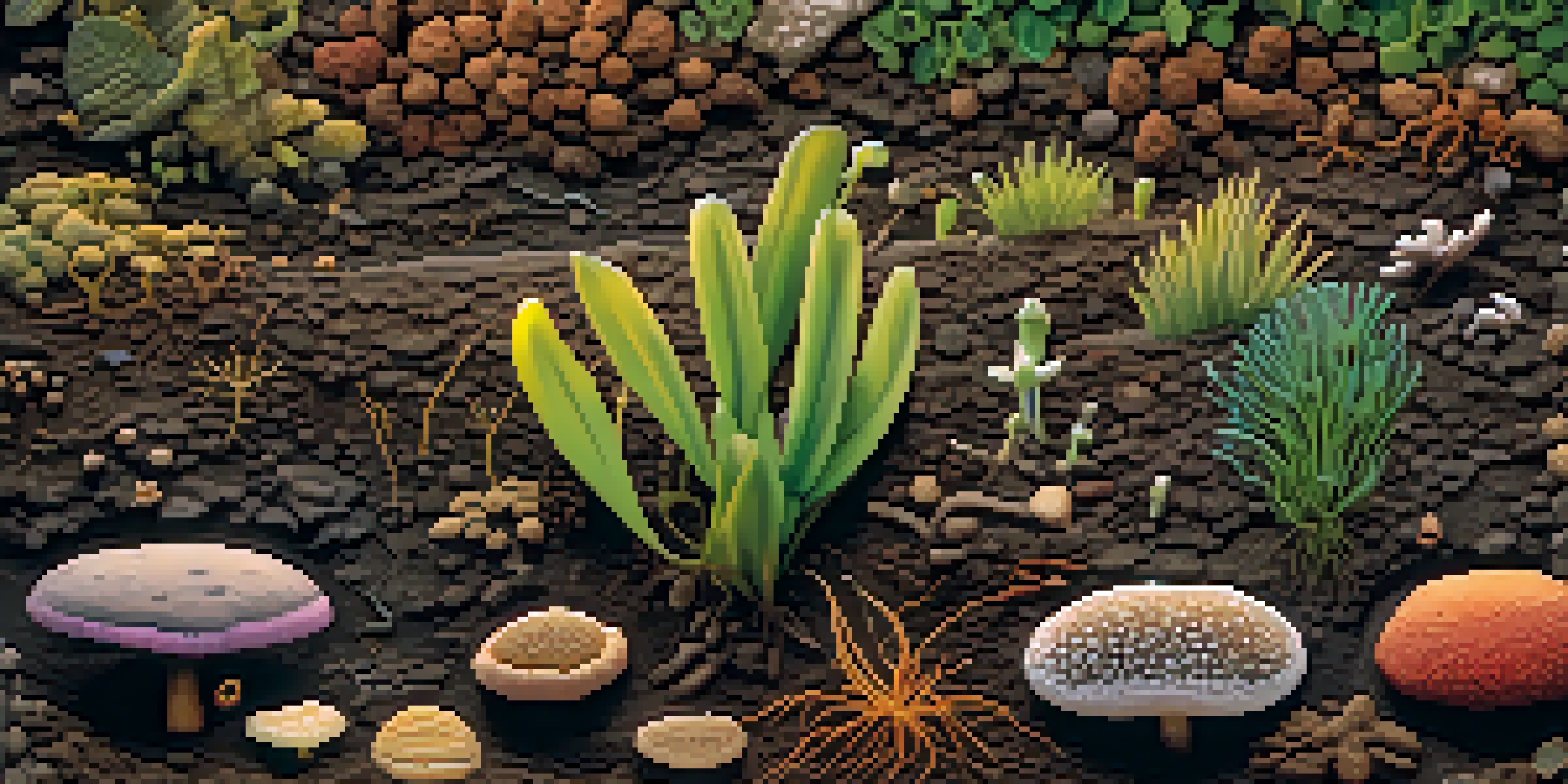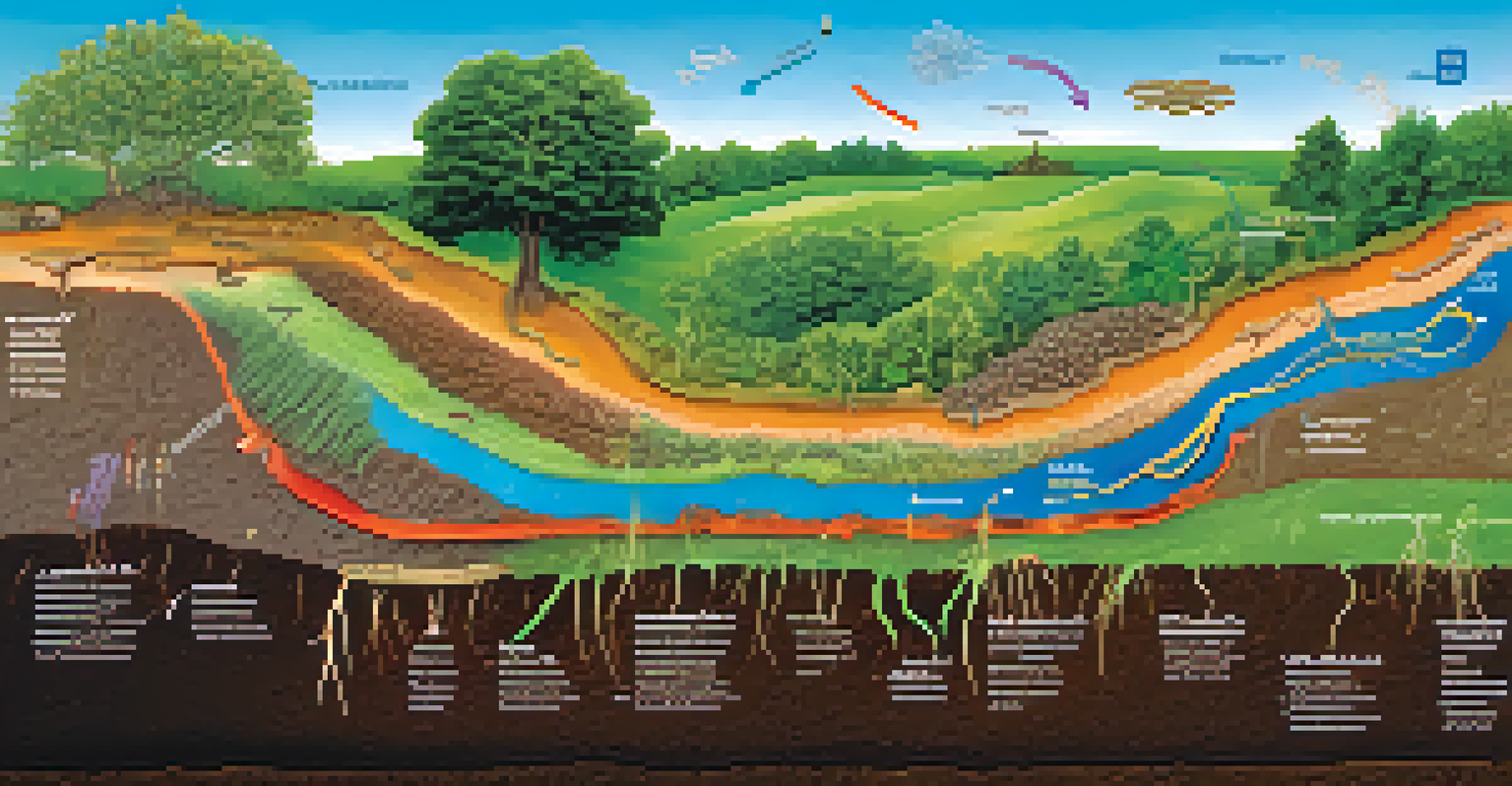The Importance of Soil Microorganisms for Fertility

Understanding Soil Microorganisms and Their Roles
Soil microorganisms, including bacteria, fungi, and protozoa, are tiny but mighty players in the ecosystem. They exist in complex communities, each fulfilling unique roles that contribute to soil health. These microorganisms help decompose organic matter, transforming it into nutrients that plants can readily absorb.
The health of our soil is critical to our food systems and the sustainability of our planet.
Imagine microorganisms as the busy workers in a factory; they break down raw materials and create a finished product that supports life above the ground. Without them, plants would struggle to access the vital nutrients they need to grow. This intricate network of life is essential for maintaining a balanced and fertile soil ecosystem.
Moreover, soil microorganisms contribute to soil structure, enhancing its ability to retain moisture and air. This means healthier plants, better crop yields, and a more resilient agricultural system overall.
Nutrient Cycling: The Microbial Contribution
One of the key ways soil microorganisms enhance fertility is by facilitating nutrient cycling. They break down complex organic materials into simpler compounds, making nutrients like nitrogen, phosphorus, and potassium available to plants. This process is crucial for promoting robust plant growth and development.

Think of nutrient cycling as a relay race, where microorganisms pass nutrients from one form to another. For example, nitrogen-fixing bacteria convert atmospheric nitrogen into a form that plants can use. This natural cycle ensures that nutrients are continuously replenished in the soil, supporting ongoing plant health.
Microorganisms Enhance Soil Health
Soil microorganisms play critical roles in nutrient cycling, soil structure, and plant health, making them essential for a balanced ecosystem.
Understanding the role of microorganisms in nutrient cycling emphasizes the need for sustainable farming practices. By nurturing these organisms, farmers can improve soil fertility while reducing the reliance on chemical fertilizers, leading to healthier crops and a healthier planet.
Microorganisms and Soil Structure: A Symbiotic Relationship
Soil microorganisms also play a vital role in improving soil structure, which is essential for root development and water retention. They produce substances like polysaccharides that help bind soil particles together, creating a more stable and porous environment. This structure allows air and water to circulate effectively, benefiting plant roots.
Healthy soil is the basis of healthy food and healthy people.
Picture soil as a sponge; when it's well-structured, it can absorb water and nutrients more efficiently. Healthy microorganisms contribute to this spongy texture, ensuring plants have access to the resources they need. Poor soil structure can lead to issues like erosion and nutrient leaching, which can severely impact agricultural productivity.
By fostering a diverse microbial community, farmers can enhance soil structure, leading to improved plant growth and resilience against environmental stresses. This symbiotic relationship underscores the importance of microorganisms in sustaining agricultural ecosystems.
The Impact of Soil Microorganisms on Plant Health
Healthy soil microorganisms not only boost fertility but also play a crucial role in plant health. They can protect plants from diseases by outcompeting harmful pathogens for resources or by producing antimicrobial compounds. This natural defense mechanism is essential for reducing the need for chemical pesticides.
Imagine microorganisms as tiny guardians of the plant world; they patrol the soil, ensuring that harmful invaders are kept at bay. Healthy plants are better equipped to withstand environmental stresses like drought or nutrient deficiencies, thanks to the support of their microbial allies.
Sustainable Practices Boost Microbes
Adopting sustainable farming practices like crop rotation and cover cropping can protect and promote the health of soil microorganisms.
By promoting a thriving microbial community in the soil, farmers can enhance plant health and resilience. This holistic approach to agriculture emphasizes the interconnectedness of soil health, plant health, and ultimately, food security.
The Threat of Soil Degradation and Microbial Loss
Despite their importance, soil microorganisms are under threat from various factors, including soil degradation and the overuse of chemical fertilizers. Practices like monoculture farming and heavy tillage can disrupt microbial communities, leading to a decline in soil health. This degradation can result in reduced fertility and increased vulnerability to pests and diseases.
Visualize soil degradation as a house losing its foundation; without a strong base, everything above it becomes unstable. The loss of microorganisms is akin to removing essential building blocks from this foundation, compromising the entire system. This highlights the urgent need for sustainable practices that protect and restore microbial communities.
Addressing soil degradation through regenerative farming practices can help restore balance to the soil ecosystem. By fostering a healthy microbial community, farmers can enhance soil fertility and ensure the long-term sustainability of agricultural systems.
Sustainable Farming Practices to Support Soil Microorganisms
To protect and promote soil microorganisms, farmers can adopt sustainable practices like crop rotation, cover cropping, and reduced tillage. These methods encourage biodiversity in the soil and create a conducive environment for microorganisms to thrive. For instance, planting cover crops can provide organic matter and nutrients that feed beneficial microbes.
Consider sustainable farming as a nurturing approach to agriculture; it prioritizes the health of the soil and, by extension, the plants that grow in it. By rotating crops, farmers can prevent the depletion of specific nutrients and encourage a diverse range of microorganisms to flourish. This diversity is key to maintaining a resilient soil ecosystem.
Soil Degradation Threatens Ecosystems
Soil degradation due to practices like monoculture and heavy tillage can harm microbial communities, leading to reduced soil fertility and increased vulnerability to pests.
Incorporating organic amendments like compost can also enhance microbial activity, leading to improved soil fertility. These practices not only benefit the soil but also contribute to the long-term viability of farming operations.
The Future of Soil Microbiology and Agriculture
As we face global challenges like climate change and food security, the role of soil microorganisms will only become more critical. Research in soil microbiology continues to uncover the complex interactions between microbes, plants, and the environment. Understanding these relationships can provide valuable insights into sustainable agriculture.
Imagine the future of farming as a symbiotic partnership between humans and microorganisms; together, they can create a more resilient food system. Innovations in soil microbiology could lead to new strategies for enhancing soil health, improving crop yields, and reducing environmental impacts.

By investing in research and education around soil microorganisms, we can empower farmers to adopt practices that support microbial communities. This is not just an agricultural issue; it’s a vital step towards a healthier planet and sustainable future.